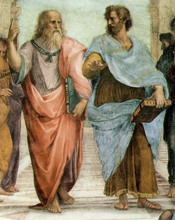Welcome to the Paradeigma Study Center
Do you sometimes have doubts about your own faith, despite having received some teaching in the church or the academy in the past? Do you find yourself feeling unconvinced by the current or ‘traditional’ arguments for the existence of God?
Perhaps you are a Christian believer, or perhaps you are a skeptic. Regardless, you may have found yourself having gnawing doubts about the future, the meaning of life, and the possibility of any afterlife beyond death.
If so, then perhaps the Paradeigma Study Center is for you! I have conceived of such a study center as a personal, restful place where anyone — whether currently a student in formal education or not — may come for guided study, at his or her own pace, to find answers for the ultimate questions of life and to resolve one’s own doubts. No college credit is currently possible at the Paradeigma Center, unless by special permission of any particular professor, but formal college credit may be possible in the future.
When I was doing graduate study in philosophy and theology, despite having a reasonably strong Christian faith, I found myself being rather unconvinced, on the one hand, by modern arguments justifying religious faith, or, on the other hand, by the more ‘traditional’ arguments for the existence of God which were formulated by figures such as Thomas Aquinas and Anselm during the Middle Ages.
By my reading, the modern methods of presuppositionalism and evidentialism seemed to be corroborative in important, helpful ways, but not conclusive in acheiving knowing of divine existence. Likewise, the traditional arguments seemed of such a nature that they might be useful in a corroborative way, such as in debate, but I did not see them as being conclusive — arguably, they contain some logical fallacies (e.g., the “Fallacy of Composition”), contain equivocations on certain terms, and are question-begging (avoiding the point) on important topics dealt with in classical philosophy, such as the challenge of Heraclitus’ Doctrine of Flux.
However, after a lot of agonizing, and more than a bit of study, I was happy to discover a more ancient methodology and school of thought for apprehending the existence of God — a “deeper magic,” to borrow a phrase from C.S. Lewis — a method which preceded the modern and medieval ones.
That method is classical exemplarism, which was developed by figures such as Augustine, Bonaventure, John Scotus Eriugena, and others, which borrowed from the earlier platonists on important points while disagreeing on other points. Exemplarism involves the direct, non-syllogistic apprehension of universally given divine properties — a far different methodology than the others mentioned above. Exemplarism involves certainty of knowledge in regard to divine existence, rather than just probability arguments. And that’s exciting, because it’s rather frustrating to attempt to relate to a probable God!
Because exemplarism is given such short shrift nowadays in the academy (even in Christian schools), and not even taught in most churches, I decided to launch the Paradeigma Study Center to fill that gap and need.
I recently have relocated the Paradeigma Study Center to the Breckenridge, Colorado, area. Here, I hope to welcome people for instruction, both on an individual consultation basis, as well as on a group teaching basis.
Meanwhile, I will continue to work on this site to provide some thought-provoking essays for those who are interested. I welcome any questions or discussions, so I encourage you to send them to me by e-mail (TLFirnberg@aol.com).
Come discover a lost world of transcendent truth and life — your own!


